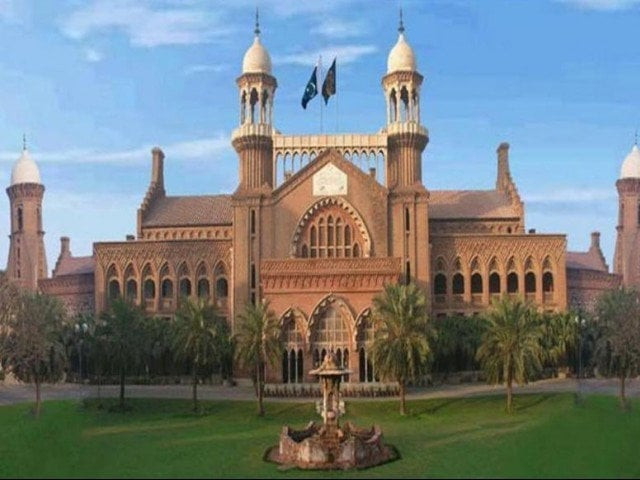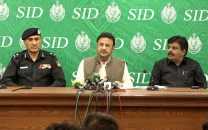LHC CJ 'ruffles executive's feathers' amid mounting tensions
Executive authorities appear uneasy with CJ's decisions, including nomination of judges

After the Islamabad High Court (IHC), executive authorities find themselves under increased tough time from Lahore High Court (LHC) Chief Justice Malik Shehzad Ahmed Khan during his initial two months in office.
Not only are executive authorities feeling the heat, but the legal community in Lahore is also expressing discontent with CJ Khan's actions.
Upon assuming his role, CJ Khan swiftly marked cases with political implications, assigning them to particular judges within the high court. The move often resulted in outcomes unfavourable to the executive branch.
Notably, the Pakistan Tehreek-e-Insaf (PTI) received relief in cases, particularly those pertaining to election disputes.
Furthermore, CJ Khan nominated five additional LHC judges to preside over election tribunals. This contrasts with his predecessor Ameer Bhatti, who had appointed only two judges to handle election disputes province-wide.
Read: LHC orders prompt decision on PTI requests for election activities
There are reports that the executive authorities are uneasy with the nominated five judges. Consequently, the Election Commission of Pakistan (ECP) has refrained from officially notifying them as election tribunals, resulting in an ongoing deadlock.
Meanwhile, the Pakistan Tehreek-e-Insaf (PTI) appears to be capitalising on the situation. PTI leaders are viewing the Lahore High Court with optimism and hope for potential advantages in the current circumstances.
Sources informed The Express Tribune that tension persists between the LHC CJ and executive authorities regarding the appointment of five judges to Anti-Terrorism Courts (ATCs) in Punjab. Among them, two judges have been proposed for ATCs in Lahore, one for ATC Faisalabad, and one for ATC Sahiwal.
It has been revealed that LHC CJ has submitted the names of five ATC judges for appointment, yet the government has not taken any action to notify them. These appointments hold significant importance as the appointed judges will preside over the trials of individuals implicated in the May 9, 2023 incidents.
Sources disclosed to The Express Tribune that executive authorities are expressing concerns that these judges may be reluctant to apply terrorism charges to the accused individuals involved in the May 9 incidents.
Several PTI leaders in Punjab have had Anti-Terrorism Act (ATA) cases filed against them.
Over the past two months, LHC CJ has convened two full court meetings, during which a majority of judges acknowledged that interference from agencies in judicial functions is a widely recognised "secret."
The judiciary in Punjab has suggested eliminating the executive's involvement in the appointment and transfer of special court judges as a means to curb judicial manipulation.
The LHC stated in its reply submitted to the Supreme Court that there always remain more chances of interference in the ATC [anti-terrorism court], NAB [accountability] and anticorruption courts where sensitive matters are decided.
“Therefore the high courts should be empowered to directly make transfers and postings of the judges of said courts without approval/interference of the federal government,” it stated.
“The relevant provisions of law in this respect be directed to be announced immediately," it added.
The SC is hearing a suo motu case regarding alleged meddling by intelligence agencies in Islamabad’s district and high courts.
Confrontations on multiple fronts
Meanwhile, LHC CJ Malik Shahbaz Ahmed Khan has initiated a confrontation with lawyers on multiple issues, particularly the relocation of lower courts to new premises within Lahore city.
It has been reported that police employed force against lawyers on Wednesday without prior authorisation from Chief Minister Punjab Maryam Nawaz.
A PML-N lawyer believed that the IG and chief secretary of Punjab are receiving instructions from “somewhere else”.
He mentioned an enduring rivalry between the leadership of the Independent Group, notably Ahsan Bhoon, and LHC CJ dating back to the lawyers' movement.
Throughout the lawyers' movement, LHC CJ aligned himself with ex-CJP Iftikhar Muhammad Chaudhry, while figures like Ahsan Bhoon were part of the anti-lawyers' movement camp, aligning themselves with LHC CJ Chaudhry Iftikhar Hussain at the time.
He asserts that the longstanding rivalry persists, evident even in the recent appointment of LHC judges.
He alleges that the LHC CJ have a ‘soft corner’ towards the Professional Group leadership.
However, another lawyer contended that both factions oppose the LHC CJ regarding the transfer of district courts in Lahore. Even the head of the Professional Group, Hamid Khan, has criticised him in his speeches.
Similarly, PTI lawyers also object to the LHC CJ's coercive actions against lawyers.
It has been revealed that the Punjab government is hesitant to pursue legal action against lawyers in the future. Even the Punjab CM is displeased with the police's actions against lawyers. The Independent Group led by Ahsan Bhoon has been supporting the current administration for the past five years.
If the LHC wishes to take action, it should commence contempt proceedings against the lawyers. However, the Punjab government should avoid registering ATA cases against them.
It has been revealed that there is a view within the LHC that CJ Malik Shahzad Ahmad Khan should not engage in two conflicts simultaneously.
Read: LHC makes procedure to obtain physical remand more viable, transparent
The ongoing debate also questions whether the LHC CJ will be promoted to the Supreme Court after taking steps that have irked executive authorities, security establishments, and lawyers.
A leader from the Independent Group believes they will never recommend the LHC CJ to Chief Justice of Pakistan Qazi Faez Isa, for appointment as an SC judge. If they were to make such a request to the CJP, the purpose behind these actions would be fulfilled, he added.



















COMMENTS
Comments are moderated and generally will be posted if they are on-topic and not abusive.
For more information, please see our Comments FAQ